European Leadership Forum
Many Christian leaders feel that they are on their own. If they have access to leadership training resources (theological, management, skills, apologetics, etc), these are usually limited to resources in their native language or within their own denomination.
One of the basic strategies of the European Leadership Forum is to identify common needs of European evangelical leaders and then find the best resources to help meet those needs (Local Leaders' Needs / God's Global Resources).
Some of these resources might be addressed at the Forum itself -- but sometimes the Forum is only an introduction.
See the website
Thursday, June 29, 2006
Wednesday, June 21, 2006
Doulos In West Port
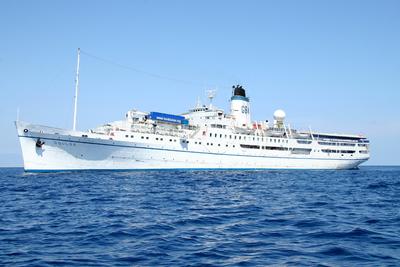 The ship DOULOS will be in Malaysia! If you are a book lover, this event is Nirvana. Dirt-cheap and excellent quality stuffs. No joke.
The ship DOULOS will be in Malaysia! If you are a book lover, this event is Nirvana. Dirt-cheap and excellent quality stuffs. No joke. Just to illustrate.. the last time doulos landed in Kuching, I bought a booklet called The Supremacy of God in Preaching (for RM 8-10) and gave a few copies to my pastors for Christmas
Then, I found the same book in a local bookstore costing RM 40!! It's that big a difference... I plan to plunder the ship on 6 July and never go near a bookshop for the remainder of the year :) I kid u not! hehehe...
Details are as follows:
6 July – 31 July 2006
Star Cruises Terminal, West Port
Hurry onboard! Don't miss it! Book Fair Opening Hours
6 July (Thu) 2pm – 10pm
7 July ~ 31 July 2006
Tue – Sat: 10am – 10pm
Sun & Mon: 2pm – 10pm
Crest Malaysia
CREST is an organization of Christians from different denominations and churches who share a desire to reach the poor & needy and disaster victims with the love of God, demonstrated in practical ways in food, shelter, medicine, etc.
Teams of volunteers armed with multidisciplinary skills and God’s love reaching the most desperate, needy and receptive people in the world
Our vision is to have stand-by teams ready to be deployed to crisis relief work within the 10/40 Window. Like a reservist army, the teams will be on stand-by in advance at different times of the year. They will be deployed to do relief work / missions trips for short durations of between 1 to 2 weeks each time.
The goal is to harness not only the spiritual but also the natural and secular skills of Christians of multi-disciplinary backgrounds (cooks, housewives, children’s ministry workers, administrators, secretaries, electricians, plumbers, mechanics, engineers, doctors, nurses, dentists, accountants, logisticians, managers, worship leaders, intercessors, etc, ANYONE!). This way the whole church can get involved in missions in very “down to earth” practical ways, not just those who can preach and teach or feel called into full-time missions.
Our Mission
To be the "hands and feet" of Jesus bringing His love and hope to those caught in crises and disasters.
Research and statistics show that disasters and crises are increasing at an alarming rate among the poorest, most needy and unreached peoples of the world. God’s original mandate and concern is seen in His command for the tithes to be for the Levites, the aliens (refugees), the fatherless and the widows : Deut.14&26. God has called us to establish a crisis relief team made up of Christians from different denominations and skills who will train and work together to demonstrate His love and bring relief to people where the needs are most acute and urgent.
We are to go with His compassion, to be His feet and His hands, to comfort those who mourn, to bind up the broken-hearted, to bestow on them a crown of beauty instead of ashes, the oil of gladness instead of mourning and a garment of praise instead of a spirit of heaviness. Isa.61.
Jesus identified so much with the poor, weak and oppressed that He said, “I was hungry and you gave me something to eat, I was thirsty and you gave me something to drink, I was a stranger and you invited me in, I needed clothes and you clothed me, I was sick and you looked after me, I was in prison and you came to visit me.......I tell you the truth, whatever you did for one of the least of these brothers of mine, you did it for me…” Matt. 25
CREST - Crisis Relief Services & Training Bhd
27 Jalan SS2/104, 47300 Petaling Jaya, Malaysia
Tel: +60 (3) 7725 7299 / +60 (3) 7712 1452
Email: crisis@tm.net.my
Teams of volunteers armed with multidisciplinary skills and God’s love reaching the most desperate, needy and receptive people in the world
Our vision is to have stand-by teams ready to be deployed to crisis relief work within the 10/40 Window. Like a reservist army, the teams will be on stand-by in advance at different times of the year. They will be deployed to do relief work / missions trips for short durations of between 1 to 2 weeks each time.
The goal is to harness not only the spiritual but also the natural and secular skills of Christians of multi-disciplinary backgrounds (cooks, housewives, children’s ministry workers, administrators, secretaries, electricians, plumbers, mechanics, engineers, doctors, nurses, dentists, accountants, logisticians, managers, worship leaders, intercessors, etc, ANYONE!). This way the whole church can get involved in missions in very “down to earth” practical ways, not just those who can preach and teach or feel called into full-time missions.
Our Mission
To be the "hands and feet" of Jesus bringing His love and hope to those caught in crises and disasters.
Research and statistics show that disasters and crises are increasing at an alarming rate among the poorest, most needy and unreached peoples of the world. God’s original mandate and concern is seen in His command for the tithes to be for the Levites, the aliens (refugees), the fatherless and the widows : Deut.14&26. God has called us to establish a crisis relief team made up of Christians from different denominations and skills who will train and work together to demonstrate His love and bring relief to people where the needs are most acute and urgent.
We are to go with His compassion, to be His feet and His hands, to comfort those who mourn, to bind up the broken-hearted, to bestow on them a crown of beauty instead of ashes, the oil of gladness instead of mourning and a garment of praise instead of a spirit of heaviness. Isa.61.
Jesus identified so much with the poor, weak and oppressed that He said, “I was hungry and you gave me something to eat, I was thirsty and you gave me something to drink, I was a stranger and you invited me in, I needed clothes and you clothed me, I was sick and you looked after me, I was in prison and you came to visit me.......I tell you the truth, whatever you did for one of the least of these brothers of mine, you did it for me…” Matt. 25
CREST - Crisis Relief Services & Training Bhd
27 Jalan SS2/104, 47300 Petaling Jaya, Malaysia
Tel: +60 (3) 7725 7299 / +60 (3) 7712 1452
Email: crisis@tm.net.my
Sunday, June 18, 2006
My Brain Made Me Do It!
 Despite a recent football injury (blame it on World CUp!), Ron Choong will back in Malaysia too! I believe he's one of the foremost Msian thinkers in the cutting edge interface between science and Christian theology via Metanexus and ACT ministry.
Despite a recent football injury (blame it on World CUp!), Ron Choong will back in Malaysia too! I believe he's one of the foremost Msian thinkers in the cutting edge interface between science and Christian theology via Metanexus and ACT ministry. These topics are burning contemporary issues of our generation. Dun miss it!
Date: 30 June 2006 (Fri)
Time: 8.30 pm
Venue: Community Baptist Church, PJ (near Chao Yang ss2)
Is Morality Biological? Neuroscientific studies suggest that we are chemically driven. All mental acts are determined by biochemical balance. Has morality evolved? Thus, people are hunting for the God gene, gay gene, gambling gene etc. Whats the Christian perspective to this emerging field of science?
Is Christian evangelism Immoral? The basis and drive for evangelism is the claim that Christian faith is true for everyone. How is this possible when there are so many religions to choose from? Isn't evangelism insensitive to cultures of the other?
Thursday, June 15, 2006
Common Myths About God's Will
 The Tribal Council at the deacons' board...
The Tribal Council at the deacons' board...Common Myths About Divine Guidance
by Paul Stevens
1. That God has a wonderful plan for your life (there is only one way to do His will)
2. That God wants to make the decision for you
3. That the best way to find your way is by asking for a sign
4. That God leads mainly by supernatural signs and prophetic messages
5. That God’s will is hard to find
6. That what God wants cannot be something you find pleasure in
7. That you should do what others think is best for them
8. That the expression of your personal mission remains constant through your life
THE PURITAN CONTRIBUTION – William Perkins, A Treatise on Callings
Callings are part of God’s created order, a means of serving God and sustaining God’s world through supporting oneself, one’s family and the commonwealth.
As soon as one discovers faith in Christ he or she should be taught to discover their calling
Each person has a general calling (to invoke the name of Christ and follow as a disciple) and a particular calling (the unique path of life by which you serve God and the commonwealth)
Parents should help their children discover their calling
There is an equality of callings
If a person does not judge his particular calling as the best of all callings he or she should not yield to discontentment, as did Absolom, the sons of Zebedee and Cain
The chief cause of vocation mismatch is “the lust of the spirit” (Perkins)
Repenting if necessary of the wrong reasons for entering a calling and remaining for the right reasons.
Resisting the temptation to covetousness by labouring to see our particular situations as the providence of God.
Seeking the sanctification of both the work and the worker by the Word of God and prayer.
Turning our affections from this world and setting our mind on heaven
Persisting in our callings by pruning our lives of selfish ambition and impatience
Being accountable to God on the last day
See “Vocational Conversion: An Imaginary Puritan-Baby Boomer Dialogue,” Crux, Vol XXXVII, No 4 (December 2001),2-8.
Tuesday, June 13, 2006
World Cup global sociological effects
World Cup boosts growth, binds ties, even sparks war
By Mark Rice-Oxley Correspondent of The Christian Science Monitor
Question: what quadrennial sporting extravaganza brings the world together for weeks on end, transcending war, poverty, class, and culture, and culminating in the most watched television event ever?
If you guessed the Olympics, odds are you're an American.

The rest of the world knows better. Soccer's World Cup kicks off Friday in Germany. And while the month-long spectacle may not leave much of an impression on Americans, for most other nations it is an incomparable event.
Brazilian banks will close early, British productivity will nosedive, elections in Mexico could be affected, the fate of the French prime minister may hang on results. The event will touch even the frozen wastelands of Antarctica, where scientists have set up a live Internet feed so as not to miss the action.
And at the grand finale on July 9, as many as a billion people - one-sixth of humanity - are expected to watch 22 men, adept at propelling a piece of leather around, compete for the ultimate victory in team sports.
Why is the event so popular?
One reason, says soccer writer Simon Kuper, is that the World Cup provides a stage for old rivalries to be played out. It enables small nations of the world who ordinarily have little say in that other great international sport - diplomacy - to settle scores and resolve questions of status and national identity with a few cathartic kicks
Another reason for the overwhelming popularity is that soccer is so pervasive. The international soccer federation FIFA has more members than the United Nations (207 vs. 191). Two years ago, 198 countries started out trying to qualify for this summer's finals. The game has taken root in so many places because it's so easy to prepare and play, according to Fernando Soares Schlindwein, an academic from Brazil. "The nice thing about football is that you can play it with anyone with almost anything," he says. "People play with fizzy drink cans, or oranges, or socks rolled into a ball.
It unifies people from all social class."
Read the full article here
By Mark Rice-Oxley Correspondent of The Christian Science Monitor
Question: what quadrennial sporting extravaganza brings the world together for weeks on end, transcending war, poverty, class, and culture, and culminating in the most watched television event ever?
If you guessed the Olympics, odds are you're an American.
The rest of the world knows better. Soccer's World Cup kicks off Friday in Germany. And while the month-long spectacle may not leave much of an impression on Americans, for most other nations it is an incomparable event.
Brazilian banks will close early, British productivity will nosedive, elections in Mexico could be affected, the fate of the French prime minister may hang on results. The event will touch even the frozen wastelands of Antarctica, where scientists have set up a live Internet feed so as not to miss the action.
And at the grand finale on July 9, as many as a billion people - one-sixth of humanity - are expected to watch 22 men, adept at propelling a piece of leather around, compete for the ultimate victory in team sports.
Why is the event so popular?
One reason, says soccer writer Simon Kuper, is that the World Cup provides a stage for old rivalries to be played out. It enables small nations of the world who ordinarily have little say in that other great international sport - diplomacy - to settle scores and resolve questions of status and national identity with a few cathartic kicks
Another reason for the overwhelming popularity is that soccer is so pervasive. The international soccer federation FIFA has more members than the United Nations (207 vs. 191). Two years ago, 198 countries started out trying to qualify for this summer's finals. The game has taken root in so many places because it's so easy to prepare and play, according to Fernando Soares Schlindwein, an academic from Brazil. "The nice thing about football is that you can play it with anyone with almost anything," he says. "People play with fizzy drink cans, or oranges, or socks rolled into a ball.
It unifies people from all social class."
Read the full article here
Monday, June 12, 2006
What place for God in Europe?
What place for God in Europe?
Across Europe,the conflicting currents of secularism, Christianity, and Islam are compelling Europeans to wrestle with their values as never before. In this first installment of a three-part series, the Monitor examines the forces that are shaping European identity - and explores why the Continent is debating what role, if any, religion should play in public life.
By Peter Ford Staff writer of The Christian Science Monitor
Read the full article here
Read the second part here
Across Europe,the conflicting currents of secularism, Christianity, and Islam are compelling Europeans to wrestle with their values as never before. In this first installment of a three-part series, the Monitor examines the forces that are shaping European identity - and explores why the Continent is debating what role, if any, religion should play in public life.
By Peter Ford Staff writer of The Christian Science Monitor
Read the full article here
Read the second part here
Thursday, June 01, 2006
Primer On Postmodernism
Presentation slides from Agora Forum on Postmodernism in Dec 2005. Most materials were taken from Stuart McAllister's talk at RZIM Bali Conference. But I modified them and any inaccuracy left is mine. The materials are not meant to be comprehensive replacement of the speaker's speech :)
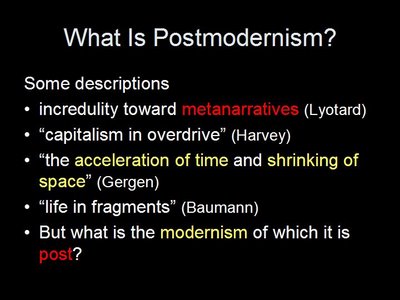
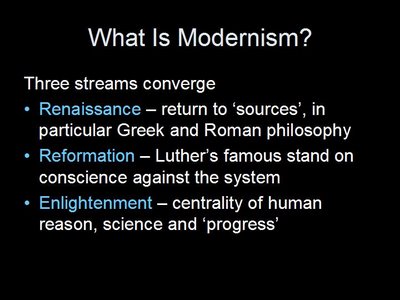

The middle guy is David Hume, the skeptical empiricist.
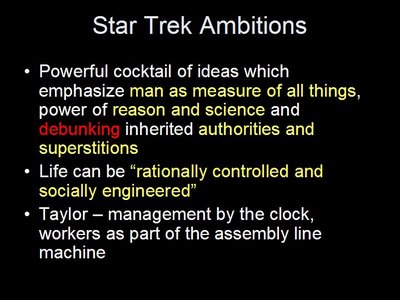
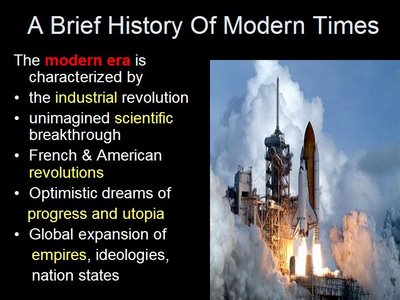
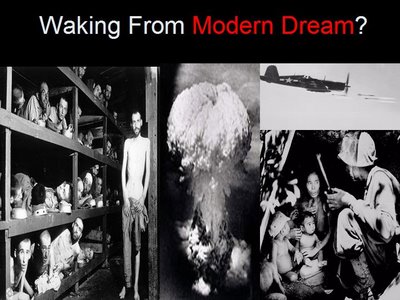
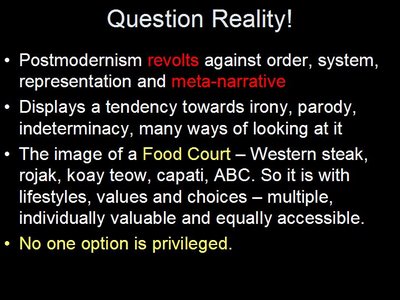
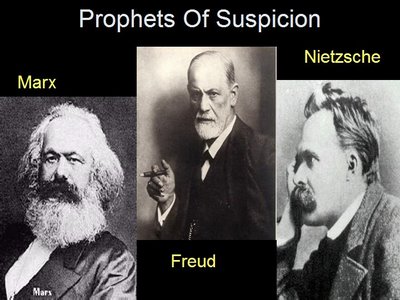
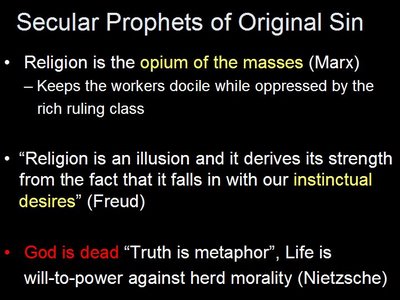

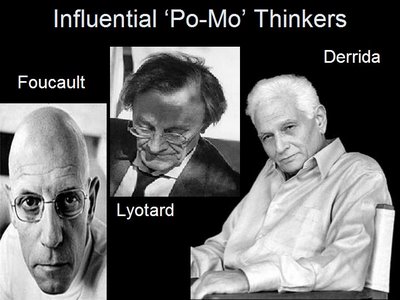
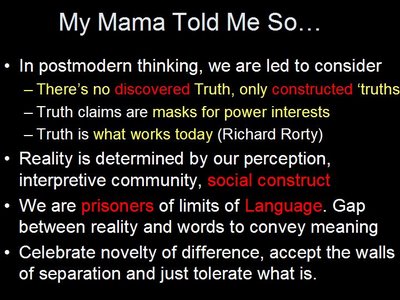
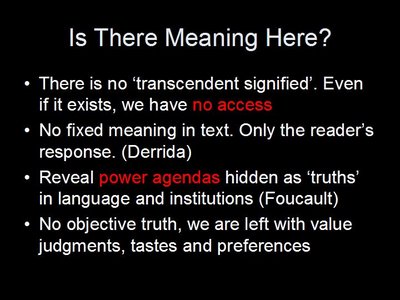



I Shop Therefore I Am
Hyper-Consumerism: If life is a supermarket, and moral choices are like the products on the shelves, then all that matters is personal choice.
The only problem is the lack of freedom to choose. A determined failure to acknowledge limits and boundaries
Gospel Opportunities
Weakened pride in autonomous reason and naturalistic scientism
Openness to the ‘supernatural’
Yearning for authentic relationships
Need to see gospel embodied before it is proclaimed
Be sensitive to context, history, culture, locality, earthiness, here-and-now rather than extreme other-worldliness
Gospel Challenges
Suspicion of evangelistic ‘propaganda’, more conversation
False dichotomy – Love versus Truth. “Speak the Truth In Love” (Eph 4:15)
Organized religion is out, personal spirituality is in
Gospel subverted as ‘one of many stories’ Social pressure of relativism which is intolerant of Christian faith in particular
Our Calling
Understand the times, every era has its challenges
Confidence in God and His truth
Indwell the gospel, take the risk to effective persuasion
Demonstrate ‘earthly good’
Dialogue… What Would Jesus Ask?
C. S. Lewis’ argument from desire, longing? (1 Peter 3:15-16)



The middle guy is David Hume, the skeptical empiricist.













I Shop Therefore I Am
Hyper-Consumerism: If life is a supermarket, and moral choices are like the products on the shelves, then all that matters is personal choice.
The only problem is the lack of freedom to choose. A determined failure to acknowledge limits and boundaries
Gospel Opportunities
Weakened pride in autonomous reason and naturalistic scientism
Openness to the ‘supernatural’
Yearning for authentic relationships
Need to see gospel embodied before it is proclaimed
Be sensitive to context, history, culture, locality, earthiness, here-and-now rather than extreme other-worldliness
Gospel Challenges
Suspicion of evangelistic ‘propaganda’, more conversation
False dichotomy – Love versus Truth. “Speak the Truth In Love” (Eph 4:15)
Organized religion is out, personal spirituality is in
Gospel subverted as ‘one of many stories’ Social pressure of relativism which is intolerant of Christian faith in particular
Our Calling
Understand the times, every era has its challenges
Confidence in God and His truth
Indwell the gospel, take the risk to effective persuasion
Demonstrate ‘earthly good’
Dialogue… What Would Jesus Ask?
C. S. Lewis’ argument from desire, longing? (1 Peter 3:15-16)
Subscribe to:
Comments (Atom)









